Parallel Event 17th March 2017
The INLW Board was represented at the CSW by Khadija El Morabit (Vice President for MENA region), Maysing Yang, (Vice President for Asia), Lysbeth van Valkenburg (Treasurer), Margaret de Vos van Steenwijk (President) and, Leticia Gutíerrez (Member of the Board) and also by INLW member Petra Rona. Joaquima Alemany (Past President) was also present representing Dones Libertatt et Democratia as Chairman.
 Unfortunately, because of the winter storm In New York, all programs were cancelled on Tuesday 14th. Luckily for us our parallel event was rescheduled on Friday 17th in the morning.
Unfortunately, because of the winter storm In New York, all programs were cancelled on Tuesday 14th. Luckily for us our parallel event was rescheduled on Friday 17th in the morning.
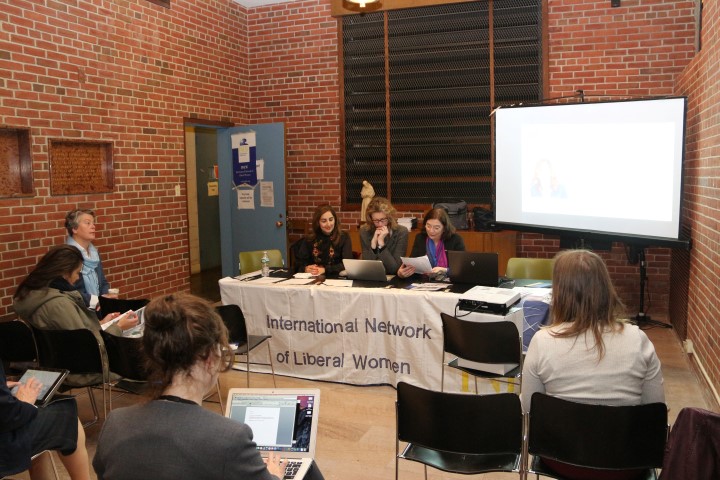 The main theme of CSW “Women’s economic Empowerment in the Changing World of Work” was lead in our choice for the event focusing on:
The main theme of CSW “Women’s economic Empowerment in the Changing World of Work” was lead in our choice for the event focusing on:
“Overcoming Challenges facing women in Business in this changing world”.
The objective was to provide an insight into the situation of women starting up business as well as running a business and their possibilities for economic empowerment around the world in these changing times.
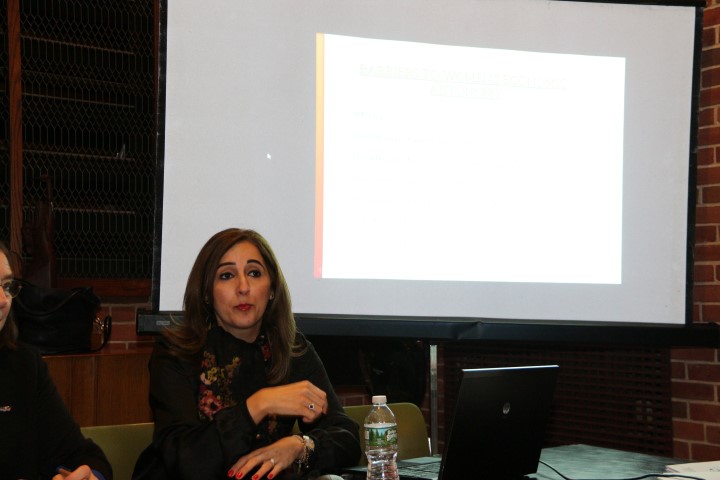 Khadija El Morabit (Entrepreneur and General Manager of a hotel business) gave her experience of starting any business as an independent woman in her home country of Morocco. For many years, it was very problematic to start any business as a woman. The reasons are the lack of women’s economic autonomy, due to illiteracy, low level of wages and income; unequal sharing of domestic chores; lack of places of child care and the high prices; lack of access to decision-making power related to the economy and lack of access to resources and means of production. But fortunately, the possibilities are better today. Feminine entrepreneurship is recognized now as source of growth, job creation, innovation and wealth in Morocco. Still the lack of publicity about public institutions that help and support entrepreneurship for women and the fact that many businesses make a start via an entrepreneurship, where business is integrated in a parental company and the fact that women do not inherit the family business is a great disadvantage for women entrepreneurs and poses a problem for specific support programs dedicated to these women entrepreneurs who want to start their own business.
Khadija El Morabit (Entrepreneur and General Manager of a hotel business) gave her experience of starting any business as an independent woman in her home country of Morocco. For many years, it was very problematic to start any business as a woman. The reasons are the lack of women’s economic autonomy, due to illiteracy, low level of wages and income; unequal sharing of domestic chores; lack of places of child care and the high prices; lack of access to decision-making power related to the economy and lack of access to resources and means of production. But fortunately, the possibilities are better today. Feminine entrepreneurship is recognized now as source of growth, job creation, innovation and wealth in Morocco. Still the lack of publicity about public institutions that help and support entrepreneurship for women and the fact that many businesses make a start via an entrepreneurship, where business is integrated in a parental company and the fact that women do not inherit the family business is a great disadvantage for women entrepreneurs and poses a problem for specific support programs dedicated to these women entrepreneurs who want to start their own business.
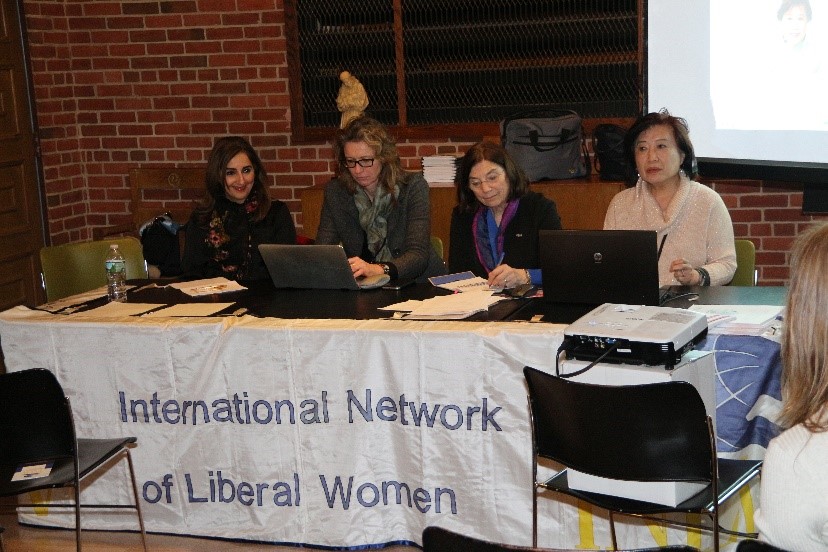 Our Member from Asia (Taiwan), Maysing Yang (Vice President for Asia), gave her view of possibilities in her region. When she started her own business, she had to have a man as president without his signature she could not start a business so she started as a vice-president in her own company to get started. It takes many years to start a business, certainly if you don’t want to bribe any people to start. The education for girls is getting better so in the future opportunities will improve but men get jobs more easily than women. In any question of heritage in Asia the eldest son inherits the assets. That is going to be changed but the culture is not so easily changed so it will take many years to get this working.
Our Member from Asia (Taiwan), Maysing Yang (Vice President for Asia), gave her view of possibilities in her region. When she started her own business, she had to have a man as president without his signature she could not start a business so she started as a vice-president in her own company to get started. It takes many years to start a business, certainly if you don’t want to bribe any people to start. The education for girls is getting better so in the future opportunities will improve but men get jobs more easily than women. In any question of heritage in Asia the eldest son inherits the assets. That is going to be changed but the culture is not so easily changed so it will take many years to get this working.
The government is investing in women and recently a law has been adopted to assist start-ups.
One of the things women must do more, is investing in their network! The men meet each other for instance after work and build their network, through this male network many jobs are given to men. Women often underestimate the importance of mingling with other women and men.In the new age, you can see that young people try to find each other via on-line communities. Investing in ICT and knowledge of all its possibilities is very important for the future.
Our Speaker from the Netherlands, Jaqueline Prins, had already left after the winter storm for her job in the Netherlands.
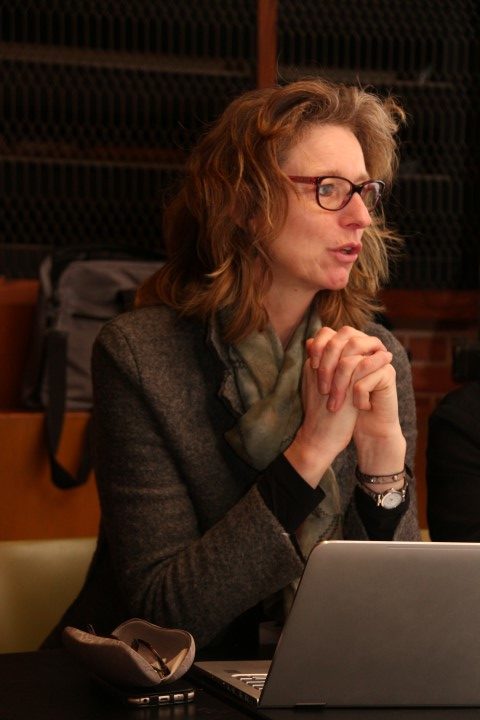 We were happy to welcome Antia Wiersma, deputy Director Atria – Netherlands Institute for Gender Equality and Women’s History.
We were happy to welcome Antia Wiersma, deputy Director Atria – Netherlands Institute for Gender Equality and Women’s History.
Antia Wiersma gave us some insight in the women empowerment in the Netherlands. There are still many women working part time (75% of women compared to 22% of men). Unfortunately, this also means that only 54 % of the working women are economically independent and many women work in the less paid jobs and are paid less. World Wide, women only make 77 cents for every dollar earned by men. This also influences the gender pay gap which amounts to 22%. Young women start out earning more being highly educated, but by age 30 they earn less than men.
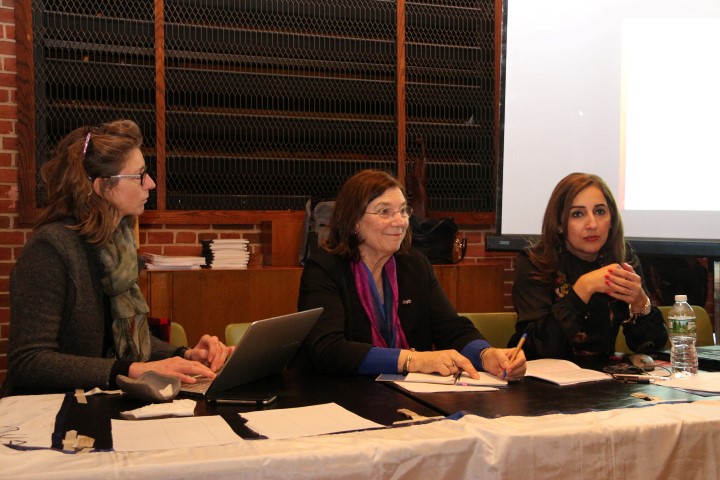 In the Dutch parliament 36 % of the parliamentarians are women. On the Dutch TV 1 in 3 persons in the talk shows are women and only 12 % of the experts that are asked to participate are women. So, although many things are well arranged for women there are still quite some things to improve.
In the Dutch parliament 36 % of the parliamentarians are women. On the Dutch TV 1 in 3 persons in the talk shows are women and only 12 % of the experts that are asked to participate are women. So, although many things are well arranged for women there are still quite some things to improve.
One of the discussions in the Netherlands is about maternity leave and if a quota about the number of women working in decision-making positions in companies and the government is a clever idea.
“We have to educate the girls about the importance of economic empowerment and independence”. Mrs. Wiersma told that “by pushing the women into the working market and implementing equal pay for men and women we can really make progress for our young girls”. We want to achieve gender equality by 2030 (Planet 50/50 by 2030). We must all recognize the gender gap in work and employment and create a cohesive action-orientated plan. A plan that challenges individuals as well as the public and private sector.
“A black list of companies who are not paying equal might work, as in Switzerland”. Companies are not allowed to work for the government if they don’t show their intentions to really pay equal and have enough women in the top.
Mrs. Wiersma is convinced that if the Netherlands doesn’t take more action it will not be able to reach the 50/50 in 2030 deadline that has been agreed upon worldwide.
As what to do for the future: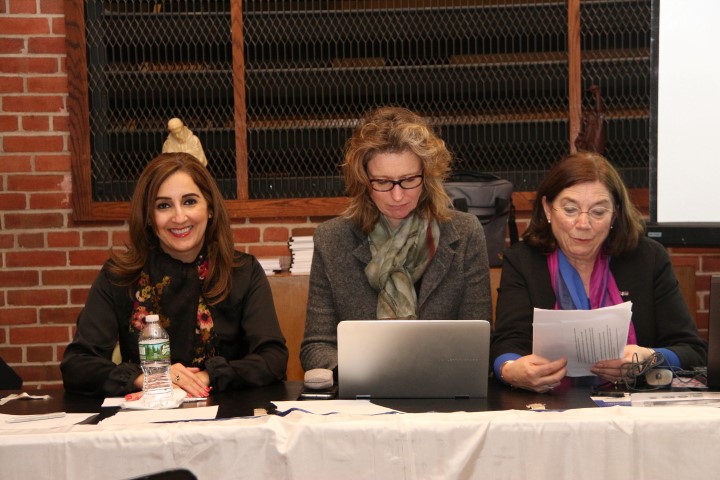
It is clear there are too few women in the so-called STEM (Science, Technology, Engineering and Mathematics) and ICT jobs. That world is still a men’s world and this must change as this is where the new jobs in the changing world will be!
In the changing world of the 4th revolution 1 in 4 women will lose their job while 1 in 20 men will lose their job. That is a challenge which must be worked on for instance by lifelong learning.
The interesting discussion between the group attending the event and the panelists gave some conclusions.
Even more insight is needed in the battle to reach the 50/50 goal.
Some of the young participants also pointed out the importance of ICT and reliable data collecting to get an insight of the results of some measures that are taken by countries all over the world. By reliable data you can enlighten the political parties so that necessary measures can be taken.
They also mentioned young women in Asia often prefer marriage to seeking jobs.
More access to finance is needed, whereby barriers of laws and rules concerning ownership of property and land; inheritance; loans only with guarantees and higher interest rates must be taken away.
Putting an effort to getting a good network is important in any business for men and women. Women must learn to make use of it and keep it up.
Moderator, Mrs. de Vos van Steenwijk, finally thanked all participants for their information and interesting discussion.
Lysbeth van Valkenburg-Lely
Margaret de Vos van Steenwijk-Groeneveld
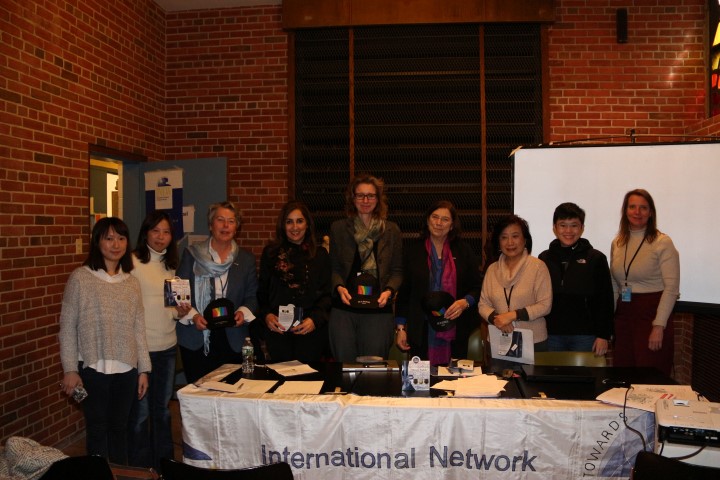
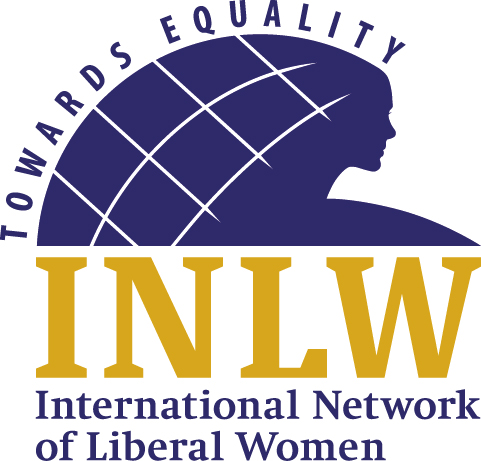
 Visit our Facebook page
Visit our Facebook page